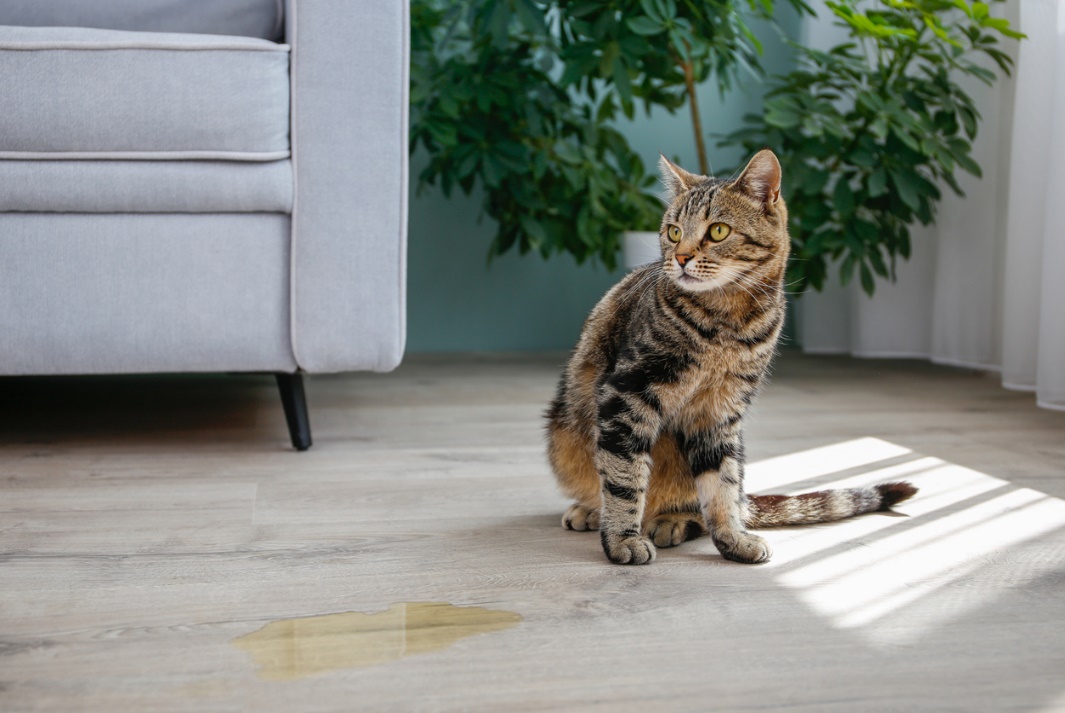At Cinema Veterinary Centre in Santa Clarita, we know how closely pet parents pay attention to their animals. Subtle changes, like your cat spending extra time in the litter box, your dog waking you at night to go outside, or your rabbit lingering by the water bottle, may seem small but can be the first signs of something serious. Frequent urination can point to underlying health issues, from urinary tract infections to life-threatening blockages that require urgent care. Recognizing these changes early can make all the difference for your pet’s health and comfort.
Frequent Urination in Cats

Cats often hide illness, so bathroom changes may be your first clue. Common causes include:
- Urinary Tract Infections (UTIs): Inflammation and pain leading to frequent urination.
- Bladder Crystals or Stones: Can cause painful urination or blockages.
- Kidney Disease: Common in older cats and linked to increased thirst and urination.
- Diabetes: Excessive drinking and urination may be early signs.
Red flags: straining, crying in the litter box, blood in urine, or urinating outside the box.
Urinary Blockages in Male Cats: A Medical Emergency
Male cats are especially prone to blockages due to their narrow urethra. Even small stones or mucus plugs can stop urine flow entirely. A blockage is life-threatening within 24–48 hours.
Signs include:
- Straining with little or no urine
- Painful crying while trying to urinate
- Only drops of urine, often blood-tinged
- Lethargy or hiding
If you see these signs, seek emergency veterinary care immediately.
Frequent Urination in Dogs
Dogs may urinate more often due to:
- UTIs
- Bladder Stones
- Kidney Disease
- Diabetes
Red flags: accidents indoors, night-time waking, visible discomfort, or blood in urine.
Urinary Blockages in Male Dogs
Though less common than in cats, male dogs can develop blockages if bladder stones lodge in the urethra.
Signs include:
- Repeated straining with little urine
- Restlessness or whining while trying to urinate
- Blood in the urine
- Licking at the urinary area
Blockages are emergencies — contact Cinema Veterinary Centre or an emergency hospital right away.
Why Some Spayed Female Dogs Experience Urine Leakage
Female dogs can also experience urinary issues unrelated to infection or stones. A condition is hormone-responsive urinary incontinence, sometimes seen in spayed females. When estrogen levels drop after spaying, the urethral muscles may weaken, allowing small amounts of urine to leak — often noticed as wet spots on bedding or floors where the dog has been resting.
This type of incontinence is not painful, but it can be frustrating for both pets and owners. The good news is that it can usually be managed with medication that strengthens the urethral sphincter or supports hormonal balance. If you notice urine leakage in your spayed female dog, it’s important to have her evaluated so we can rule out other conditions and start appropriate treatment.
Urinary Problems in Exotic Pets

Exotic pets can also develop urinary issues, and because they often hide illness, subtle changes may be the only clue.
Ferrets
- Common issues: bladder stones, UTIs, and prostate disease in males that can compress the urethra.
- Signs: frequent straining with little urine, vocalizing in pain, lethargy, or accidents outside the litter area.
- Risk: urethral blockages can be medical emergencies similar to cats and dogs.
Pocket Pets (rabbits, guinea pigs, hamsters, gerbils, rats, mice, chinchillas, hedgehogs, sugar gliders)
- Common issues: bladder stones, UTIs, sludge-like urine (especially in rabbits and guinea pigs).
- Signs: straining, frequent small urinations, blood in urine, hunched posture, decreased appetite, or soiled fur around the hind end.
- Risk: complete blockages, though rare, can quickly become emergencies.
Birds
- Common issues: kidney disease, infections, or nutritional imbalances.
- Signs: excess liquid in droppings, straining, tail bobbing, or fluffed feathers.
- Risk: Advanced kidney disease can be fatal if untreated.
Reptiles (snakes, lizards, turtles/tortoises)
- Common issues: kidney disease or urate (crystal) buildup, often due to dehydration or poor diet.
- Signs: straining, swelling near the vent, lethargy, or loss of appetite.
- Risk: severe urate blockages or impactions, especially in lizards and tortoises, can be fatal.
Amphibians (frogs, salamanders, newts)
- Common issues: kidney disease and fluid balance problems tied to water quality and nutrition.
- Signs: bloating, swelling, lethargy, or abnormal waste output.
- Risk: Advanced kidney failure can be deadly.
When to Call Cinema Veterinary Centre
If your cat, dog, or exotic pet shows urinary changes or any of the symptoms noted for their species, do not wait. Even if they appear healthy otherwise, urinary issues can progress quickly. Some conditions may require prompt treatment, while others are true emergencies.
Our veterinarians may recommend:
- Urinalysis and bloodwork to identify infection, diabetes, or kidney disease
- Ultrasound or X-rays to check for stones
- Prescription diets or medications for long-term management
- Surgical intervention if urinary blockages are present and we cannot resolve the blockage with other treatments
Supporting Urinary Health at Home
- Hydration: Ensure pets always have clean, fresh water.
- Clean Environments: Scoop litter boxes daily; clean small pet cages and reptile enclosures regularly.
- Balanced Diets: Work with your vet to choose diets that support urinary health.
- Routine Exams: Regular wellness visits help detect problems before they become serious.
Protecting Urinary Health in Cats, Dogs, and Exotic Pets
At Cinema Veterinary Centre in Santa Clarita, we understand how stressful it is to see your pet struggling. Urinary issues should never be ignored — they are your pet’s way of telling you something is wrong. Remember, accidents in the house or litter box are not usually due to misbehavior. More often, they signal that your pet is not feeling well, so it is best to check for medical issues before thinking it might be behavioral.
By monitoring your pet’s bathroom habits and reaching out when something seems unusual, you’re helping us provide timely care that prevents pain, avoids emergencies, and supports your pet’s long, healthy life. As a certified Fear Freeclinic, we are committed to making every visit as comfortable and stress-free as possible for both pets and their families.
Cinema Veterinary Centre
23460 Cinema Drive
Santa Clarita, CA
(661) 253-9300

